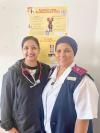Living well with Lupus: Dr shares her personal story with advice for families
May marks Lupus Awareness Month in South Africa and on 10 May, World Lupus Day, the Western Cape Department of Health and Wellness joins the global community in raising awareness about this complex, long-term autoimmune disease that can affect multiple organs and systems in the body.
This year’s theme, “Belonging. Belief. Breakthroughs.” celebrates the strength and resilience of those living with lupus. It also highlights the importance of scientific progress and public understanding of this often-misunderstood condition.
One of these warriors is Dr Deepthi Raju Abraham, paediatric rheumatology specialist at Tygerberg Hospital and the Faculty of Medicine and Health Sciences, Stellenbosch University.
“I was diagnosed with lupus at the age of 27, and was presented with arthritis, skin rashes and features of neuro lupus. As a paediatric rheumatologist and a lupus warrior, I find myself uniquely positioned to understand the struggles and triumphs faced by my patients. Being a protagonist by nature and a positive, effective optimist in action, I truly believe I’m fortunate to have two perspectives; I share it as a medical professional and as someone who battles this autoimmune disease daily. I’m a wife and mother of two cute hearts. Living with lupus has helped give me a heightened sense of purpose and acknowledge wholeheartedly that every moment in life is both a miracle and an act of faith.”
Understanding Lupus
Living with systemic lupus erythematous (SLE) or in short lupus can often feel overwhelming. This complex autoimmune disease can impact everyone differently affecting almost any part of the body. Its symptoms range from fatigue and joint pain to skin rashes, multi-organ involvement, and often, unwelcome social isolation.
Lupus affects both adults and children, but the disease presents differently across age groups. Recognizing these distinctions is crucial for accurate diagnosis, effective treatment, and long-term management. Women, particularly those of childbearing age, are predominantly affected with fatigue, joint pain, skin rashes, and organ complications. The flare-ups are triggered by stress sunlight, or infections. The treatment usually involves immunosuppressants, corticosteroids, and lifestyle adjustments to manage symptoms and prevent complications.
Paediatric lupus
In children and adolescents, lupus (childhood-onset SLE or cSLE) is often more severe. The incidence ranges between 2.0 and 7.6 per 100,000 children, with onsets typically between the ages of 12 and 14. Children are more likely to experience serious complications, such as lupus nephritis and neuro-lupus. Diagnosis in children can be delayed due to overlapping symptoms with other illnesses. Prompt referral and diagnosis are essential to managing disease progression and reducing complications.
A multidisciplinary team approach is key to successful treatment, often involving rheumatologists, nephrologists, dermatologists, psychologists and other health professionals.
Advice for lupus warriors, parents and caregivers:
- Educate yourself as caregivers: Understanding lupus, its symptoms, and treatment options is crucial. This knowledge will help you make informed decisions and advocate for your child’s health.
- Regular medical care: Ensure your child has regular check-ups with a paediatric rheumatologist. Consistent monitoring can help manage the disease effectively to monitor and review response to treatment and screen for side effects or worsening of disease.
- Medication management: Follow the prescribed treatment plan closely. Be aware of potential side effects and communicate any concerns to your healthcare provider.
- Promote a healthy lifestyle: Encourage and support a balanced diet, regular exercise, and sufficient sleep. These habits can help strengthen your child’s overall health and immune system. Doing it together as a family helps promote compliance.
- Sun protection: Since sun exposure can trigger lupus flares, ensure your child wears sunblock, protective clothing, and seeks shade when outdoors. Apply sunscreen regularly.
- Emotional support: Children with lupus may experience anxiety or depression. Provide emotional support and consider counselling or support groups for both your child and the family. Empower them to becoming “lupus warriors”.
- Monitor symptoms: Keep a diary of your child’s symptoms, triggers, and any changes in their condition. This information can be valuable for healthcare providers.
- Encourage open communication: Foster an environment where your child feels comfortable discussing their feelings and any challenges they face due to lupus.
- Be prepared for flares: Understand that lupus can have flare-ups. Be prepared with a plan for managing these episodes, including how to adjust activities as needed.
- Connect with others: Join support groups or online communities for parents of children with lupus. Sharing experiences can provide emotional support and valuable resources, for example, Andrea’s Arthritis Foundation South Africa, or Arthritis association South Africa.
By being proactive and supportive, you can help your child navigate the challenges of living with lupus while empowering and promoting their well-being. “Lupus is often called a ‘feel bad, look good’ disease. It’s difficult to explain and often misunderstood. Yet over time, this struggle reveals strength. Courage means taking one step at a time, toward what matters,” says Dr Abraham.
She concludes, “In sharing my story of courage and vulnerability, I hope to shine a light on the often-hidden battles that many face. It is a reminder that while the journey may be fraught with challenges, it is also paved with moments of profound strength and unexpected grace. I’m truly blessed and grateful for the unconditional support and understanding my family and workplace offers. Through understanding and compassion, we can foster communities that both support and raise one another in the face of adversity, transforming our collective grief into a shared journey of healing.”


